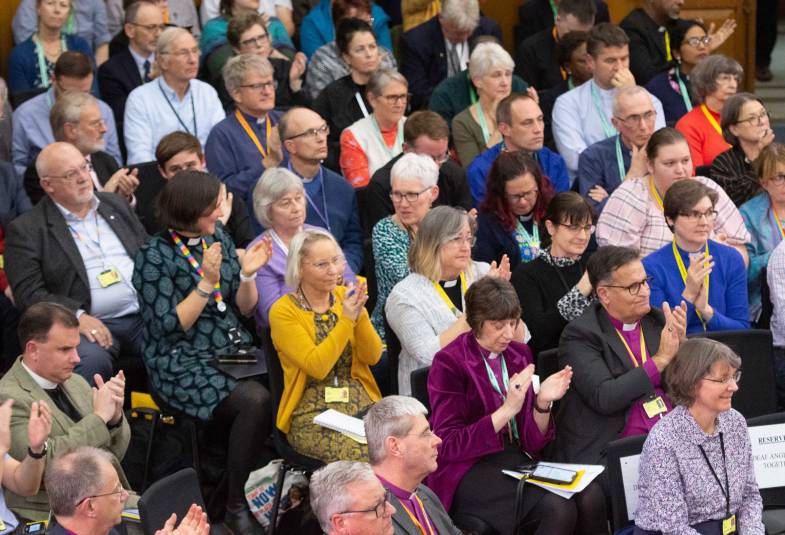15/11/2023

Thank you, Synod, for your contributions – I know that this has sometimes been painful. I cannot do justice to them but be assured they have been recorded and we will be reflecting upon them. I am grateful that I have heard new voices and those of the laity and experiences that they have had.
I want again to recognise the hurt across the breadth of belief.
We have heard the concern about openness and transparency and the House of Bishops’ Standing Committee will reflect on these comments.
As I have already said, since February the House of Bishops has met three times, the College of Bishops at least three and the Living in Love and Faith steering group over 14 times. At all of these meetings there have been legal contributions and the legal has been in conversation with theology.
This has been an iterative process, as has the development of the pastoral guidance: theology, legal advice and pastoral consideration have been in constant conversation in order to have an integrated process. Those who have advised on all aspects of Living in Love and Faith, including legal matters, have contributed to GS2328 and are satisfied that advice is accurately reflected within it.
There is no single document that we are able to give you; if there were it would be misleading because it would capture one moment in the last eight months.
Living in Love and Faith seeks to explore issues of identity, sexuality, relationships and marriage. A key emphasis has been on encountering one another in these conversations seeking understanding of one another, of our faith tradition, in a spirit of openness and deep mutual respect.
Encountering the other – if it is to be an encounter which honours the God who made and loves us all – will always be a two-way exchange. It isn’t an academic learning experience where we to gather information about something or somebody so that we can be better informed. It is a relationship. And in a relationship our boundaries are permeable. We let the other in.
This is hard work and requires courage but to hold the other at arms’ length is not really to encounter them as a person at all, but to observe them as an object.
Our challenge as a Synod is in understanding that we do not agree, is to ask ourselves how do we live as children of God, made in his image, in the midst of disagreement, resisting polarisation which seems to me to be increasing in the world and the church.
In June 2003 Rowan Williams in his General Synod address, spoke about a reality “where everyone believes that they are a persecuted minority". He went on to say that “this is not a situation that encourages easy and honest communication. It is a situation that cries out for scapegoats”.[1]
Sexuality has become weaponised, and it has become so easy for us to enter into the culture wars of our times, for we live in a time of scapegoating.
I often speak at secular events and offer them a Christian alternative – that of seeing one other made in the image of God.
The motion agreed in February 2023 was a result of listening – to God, to scripture and to one another. It was about finding that place where we can continue to live together, focussing on the mission of the Church. For many, what is being proposed does not go far enough, and for others it goes too far. None of us underestimate the deeply divisive nature of the disagreement, but this is not a credal issue. Unity, however, is. We have sought to thread reassurance through the proposals for some that will not be enough and therefore the House of Bishops has committed to look at formal structural provision.
For some, the simple fact that I have led this process has meant that they see me as no longer in communion with them. I want to reassure them that I still believe that we are in communion with one another.
And whilst I may no longer be invited to eat at their table, they will always be welcome at mine. And if it means that I need to sit outside with the powerless, the marginalised, the lost, then that’s where I will sit – and I am certain I will also encounter Christ there.
To see the other made in the image of God allows us to see them not as “the other” but with equity, as God sees them. With the love with which Jesus Christ sees the other.
And finally Cole Arther Riley, in her book ‘This Here Flesh’ writes:
‘To be able to marvel at the face of our neighbour with the same awe we have for the mountaintop, the sunlight refracting – this manner of vision is what will keep us from destroying each other.’[2]
Let us choose not to destroy one another, but truly to encounter one another. To dare to see God’s image in each another. To embrace each other without judgement. To rejoice in the gift of one another’s different understanding. To be one body, however messy. And by doing this, to know that God is in this place.
I ask Synod to vote for this amended motion.
References:
[1] http://rowanwilliams.archbishopofcanterbury.org/articles.php/1826/archbishops-presidential-address-general-synod-york-july-2003.html
[2] Cole Arthur Riley, This Here Flesh: Spirituality, Liberation and the Stories That Make Us, Hodder and Stoughton, 2022, p36
Bishop Sarah's speech can be heard at 1hr 52m 48s.